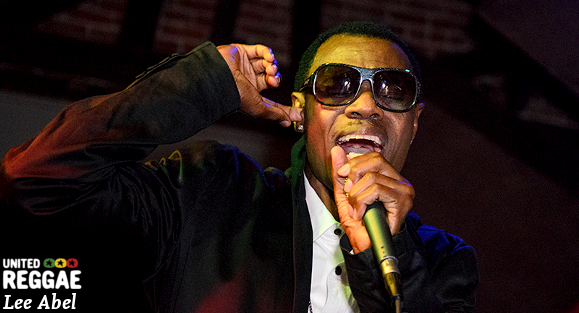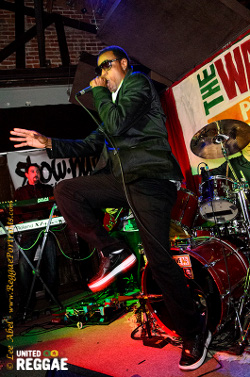Articles about reggae music, reviews, interviews, reports and more...
Wayne Wonder Live and Interview in San Francisco

Wayne Wonder Live and Interview in San Francisco
Wayne in Wonderland.
Von Wayne Charles, aka Wayne Wonder, is one of the most influential artists of his generation. It is hard to believe that Wonder is celebrating 25 years as a recording artist. His first album, self-titled, was released in 1987.
Although he is labeled as a reggae/dancehall artist, Wayne Wonder is one of Jamaica’s finest singers. As a balladeer, he is known for masterfully manipulating major and minor chords to produce achingly sweet ballads that inspire love and romance. As a dancehall artist, Wayne Wonder rides sexually-charged riddims like “Joy Ride” and “Diwali” that make you want to wine and drop it down low. Wayne Wonder is also gifted songwriter and producer who has collaborated with King Tubby, Steely and Clevie, Donovan Germain, Sly and Robbie and Tony Kelly, churning out hits such as “Child’s Play Two,” “Bounce Along,” “The Saddest Day” and a remake of Delroy Wilson’s “Movie Star,” featuring Buju Banton.

I have seen Wayne Wonder in concert countless times since 1994, but his late night to early morning set at Brick and Mortar night spot in San Francisco, Jan. 19, 2013, was different and extra special.
First of all, Wonder was backed by a live band, the Fyah Squad, featuring his longtime collaborator, Riddimfingaz, on keyboards. A singer of Wayne Wonder’s caliber should always perform with a live band. If you ever wonder where Wayne’s soul comes from, he, like many of Jamaica’s great singers, started out singing gospel in church, and sometimes that’s where he takes you.
Over the years, I’ve see Wonder perform to DJ driven tracks in the toniest of venues such as Ruby Skye in San Francisco, where he was whisked away after a brief performance.
In 2002, Wonder’s breakout album “No Holding Back,” (co-produced by Tony Kelly) achieved well deserved crossover success concurrently with Sean Paul’s “Dutty Rock,” in an era when people were first starting to catch on to hip-hop infused reggae and dancehall. Wonder found himself in regular rotation on commercial radio, on Billboard’s Hot 100 Charts and even performing alongside Sean Paul on NBC’s “Saturday Night Live.” “No Holding Back” received a Grammy nomination for Best Reggae Album.
During our interview, I told Wonder that one of my proudest moments was seeing him perform at the Wango Tango music festival at the Rosebowl stadium in my hometown, Pasadena, CA, in 2003, when he was riding on the success of “No Holding Back.” Just a few of the artists on the bill with Wayne Wonder were: Nelly, Christina Aguilera, Carlos Santana, Sting and Tyrese.
 “That event was huge, I was nervous, but once I hit the stage, the butterflies went away,” said Wonder, who hails from Portland, Jamaica. “It was a great feeling, performing with all of those superstars. It was like yeah, this is what it feels like!”
“That event was huge, I was nervous, but once I hit the stage, the butterflies went away,” said Wonder, who hails from Portland, Jamaica. “It was a great feeling, performing with all of those superstars. It was like yeah, this is what it feels like!”
Despite his low keyed off stage demeanor, Wayne Wonder is an artist who likes to reach out and touch his fans during his shows. He likes to sing, touch hands and sway with them. At the Rose Bowl, Wonder was protected by so many layers of barricades and security that it was impossible his fans and even journalists like myself to get any kind of up close and personal interaction.
Brick and Mortar is a hip and new but somewhat un-glamorous venue located in an un-adorned part of town, between San Francisco’s Mission and South of Market districts. Wonder’s dedicated fans came out in full force, as well as a younger generation of followers armed with smart phones to text, Tweet, Facebook, YouTube and Instagram every aspect of their experience. Since there was were no barriers between the performer and the audience, from the moment Wonder opened with his riddim-charged “Watching You,” (from “Da Vibe,” 2000), young revelers, one woman in particular wearing an afro and orange shirt, kept jumping on the stage to dance with him. One couple was literally dry humping, near the stage. Yes, the fans felt like they were part of the show, but that did not seem to bother the star one bit.
“Without fans, there’s no me, so I’m cool with that,” said Wonder.
As for the social networking aspect of sharing his music, Wonder replied to my question via text, “up close and personal sometimes is the one chance, so they took full advantage of it (LOL).”
Wonder also told me that his trademark, stunner shades, which can be seen in his new videos “Caught Up” and “Drop it Down Low” and “If I Ever” (featuring Mya) have made him feel more confident on stage since he began performing as a youth. Wonder is even considering coming out with his own brand of sunglasses.
During his performance of “Movie Star,” Wonder’s alter ego, DJ Surprize, came out, as he flawlessly rapped Buju Banton’s part in a husky baritone. One of the most touching and unexpected moments during Wonder’s show was his haunting rendition of Buju Banton’s “Untold Stories,” which was “livicated” to his longtime friend who is currently incarcerated in Florida on drug related charges.
If Wayne Wonder is exuding a refreshing kind of confidence on stage; it comes from his new found personal and creative freedom. After a grueling legal battle with his former label, VP Records, Wonder released “My Way,” his first album in six years, produced on his own label, the Miami-based Singso Records. He is working with the people closest to him—his wife, Jacqueline, who is also his manager, and his longtime producer, Tony Kelly.
“I stay true to myself and don’t think about the stresses of the world; and try to check myself,” said Wonder. “My music is really my therapy. When I’m down and out, I go into my studio. That’s where I put my energy. I record myself, I mix, I engineer, and I write. I’m an observer. I observe other artists. King Tubby, one of the first producers I worked with, told me that it’s not about the hype; it’s about the music that you put out—the quality music--that is what sustains you. The hype and the fans will go away. I’ve always retained that. In the early days, I had this motto: it’s not about the recognition, it’s not about the hype, it’s not about ego, it’s about the music and the work that needs to be done. That’s Wayne Wonder’s motto, and it keeps me grounded.”
Read more about this topic
Comments actually desactivated due to too much spams
Browse by categories
Recommended Articles
Latest articles
Recently addedView all
© 2007-2025 United Reggae. All Rights Reserved. Reproduction in whole or in part is prohibited. Read about copyright
Terms of use | About us | Contact us | Authors | Newsletter | A-Z








































